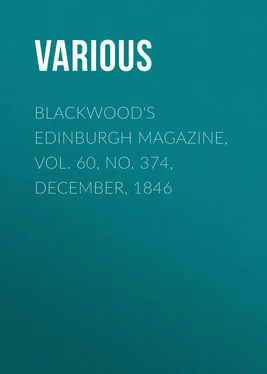Various - Blackwood's Edinburgh Magazine, Vol. 60, No. 374, December, 1846
Здесь есть возможность читать онлайн «Various - Blackwood's Edinburgh Magazine, Vol. 60, No. 374, December, 1846» — ознакомительный отрывок электронной книги совершенно бесплатно, а после прочтения отрывка купить полную версию. В некоторых случаях можно слушать аудио, скачать через торрент в формате fb2 и присутствует краткое содержание. Издательство: Иностранный паблик, Жанр: periodic, foreign_edu, Путешествия и география, на английском языке. Описание произведения, (предисловие) а так же отзывы посетителей доступны на портале библиотеки ЛибКат.
- Название:Blackwood's Edinburgh Magazine, Vol. 60, No. 374, December, 1846
- Автор:
- Издательство:Иностранный паблик
- Жанр:
- Год:неизвестен
- ISBN:нет данных
- Рейтинг книги:4 / 5. Голосов: 1
-
Избранное:Добавить в избранное
- Отзывы:
-
Ваша оценка:
- 80
- 1
- 2
- 3
- 4
- 5
Blackwood's Edinburgh Magazine, Vol. 60, No. 374, December, 1846: краткое содержание, описание и аннотация
Предлагаем к чтению аннотацию, описание, краткое содержание или предисловие (зависит от того, что написал сам автор книги «Blackwood's Edinburgh Magazine, Vol. 60, No. 374, December, 1846»). Если вы не нашли необходимую информацию о книге — напишите в комментариях, мы постараемся отыскать её.
Blackwood's Edinburgh Magazine, Vol. 60, No. 374, December, 1846 — читать онлайн ознакомительный отрывок
Ниже представлен текст книги, разбитый по страницам. Система сохранения места последней прочитанной страницы, позволяет с удобством читать онлайн бесплатно книгу «Blackwood's Edinburgh Magazine, Vol. 60, No. 374, December, 1846», без необходимости каждый раз заново искать на чём Вы остановились. Поставьте закладку, и сможете в любой момент перейти на страницу, на которой закончили чтение.
Интервал:
Закладка:
We have said that Mr Kohl is a great traveller. We withdraw the accusation. He has written forty odd volumes, but they have been composed, every one of them, in his snug stube , at Bremen, or wheresoever else he puts up, under the influence of German stoves, German pipes, and German beer. A great traveller is a great catholic. His mind grows more capacious, his heart more generous, as he makes his pilgrimages along this troubled earth, and learns the mightiness of Heaven, the mutability and smallness of things temporal. Prejudice cannot stand up against the knowledge that pours in upon him; bigotry cannot exist in the wide temple he explores. The wanderer "feels himself new-born," as he learns, with his eyes, the living history of every new people, and compares, in his judgment, the lessons of his ripe manhood with the instruction imparted in his confined and straitened youth. If it may be said that to learn a new language is to acquire a new mind, what is it to become acquainted, intimately and face to face, with a new people, new institutions, new faiths, new habits of thought and feeling? There never existed a great traveller who, at the end of his wanderings, did not find himself, as if by magic, released of all the rust of prejudice, vanity, self-conceit, and pride, which a narrow experience engenders, and a small field of action so fatally heaps up. We will venture to assert that there is not a monkey now caged up in the zoological gardens, who would not – if permitted by the honourable Society – return to his native woods a better and a wiser beast for the one long journey he has made. Should Mr Kohl, we ask, behave worse than an imprisoned monkey? We pardon M. Michelet when he rants about la belle France , because we know that the excited gentleman – eloquent and scholarly as he is – is reposing eternally in Paris, under the drapeau , which fans nothing but glory into his smiling and complacent visage. When John Bull, sitting in the parlour of the "Queen's Head," smoking his clay and swallowing his heavy, with Bob Yokel from the country, manfully exclaims, striking Bob heartily and jollily on the shoulder, "D – n it, Bob, an Englishman will whop three Frenchmen any day!" we smile, but we are not angry. We feel it is the beer, and that, like the valiant Michelet, the good man knows no better. Send the two on their travels, and talk to them when they come back. Well, Mr Kohl has travelled, and has come back; and he tells us, in the year of grace 1846, that the crown-jewel in the diadem of France is Alsace, and that the Alsatians are the pearls amongst her provincialists – the Alsatians, be it understood, being a German people, and, as far as report goes, the heaviest and stupidest that "vaterland" can claim. The only true gems in the Autocrat's crown are, according to the enlightened Kohl, the German provinces of Liefland, Esthonia, and Courland. All the industry and enterprise of the Belgians come simply from their Teutonic blood; the treasures of the Danish king must be looked for in the German provinces of Sleswig and Holstein. This is not all. German literature and the German tongue enjoy advantages possessed by no other literature and language. English universities are "Stockenglisch," downright English; the French are quite Frenchy; the Spanish are solely Spanish; but German schools have taken root in every part of the earth. At Dorpat, says Mr Kohl, German is taught, written, and printed; and therefore the German spirit is diffused throughout all the Russias. At Kiel the same process is going forward on behalf of Scandinavia. The Slavonians, the Italians, and Greeks, are likewise submitting, nolens volens , to the same irresistible influence. The very same words may be found in M. Michelet's book of "The People," – only for German spirit, read French .
Mr Kohl proceeds in the same easy style to announce the rapid giving way of the Danish language in Denmark and the eager substitution of his own. He asserts this in the teeth of all those Danish writers who have started up within the last fifty years, and who have boldly and wisely discarded the pernicious practice (originating in the German character of the reigning family) of expressing Danish notions in a foreign tongue. He asserts it in the teeth of Mrs Howitt and of the German translators, whom this lady calls to her aid, but who have very feebly represented that rich diction and flexible style so remarkable in the Danish compositions referred to, and so much surpassing the power of any other northern tongue. We should do Mr Kohl injustice if we did not give his reason for regarding the Danish language as a thing doomed. He was credibly informed that many fathers of families were in the habit of promising rewards to their children if they would converse in German and not in Danish! Hear this, Lord Palmerston! and if, on hearing it, you still allow the rising generation, at our seminaries, to ask for du pang and du bur , and to receive them with, it may be, a silver medal for proficiency, the consequences be on your devoted head!
Denmark has been comparatively but little visited by the stranger. She offers, nevertheless, to the antiquary, the poet, and the artist, materials of interest which cannot be exceeded in any other district of the same extent. Every wood, lake, heath, and down, is rich in historical legends or mythical sagas; every copse and hill, every cave and mound, has been peopled by past superstition with the elf and the sprite, the ellefolk and nissen . Her history, blending with that of her Scandinavian sisters, Norway and Sweden, is romantic in the extreme – whether she is traced to the days of her fabulous sea-kings, or is read of in the records of those who have chronicled the lives of her sovereigns in the middle ages. The country itself, although flat, is picturesque, being thickly interspersed with lakes, skirted by, and embosomed in, luxuriant beech woods; whilst ever and anon the traveller lights upon some ancient ruin of church or tower, palace or hermitage, affecting, if only by reason of the associations it awakens with an age far more prosperous than the present. The existence of the Danish people, as a nation, has been pronounced a miracle. It is hardly less. Small and feeble, and surrounded by the foreigner on every side, Denmark has never been ruled by a conqueror. Amid the rise and fall of other states, she has maintained her independence – now powerful and victorious, now depressed and poor, but never succumbing, never submitting to the stranger's yoke. Her present dynasty is the oldest reigning European family. It dates back to Christian I. – himself descended in a direct female line from the old kings of Scandinavia – who, as Duke of Oldenburg, was chosen king by the states in 1448.
A good account of Denmark and the Danes is yet wanting. It may be collected by any honest writer, moderately conversant with the language and history of the country. We fear that Mr. Kohl will not supply the literary void, if we are to judge from the one volume before us. Others are, however, to follow; and as our author is immethodical, he may haply return to make good imperfections, and to fill up his hasty sketches. We cannot but regret that he should have passed so rapidly through the Duchy of Holstein. Had he followed the highways and byways of the province, instead of flitting like a swallow – to use his own words – over the ground by means of the newly-opened railroad through Kiel, his "Travels" would surely have been the better for his trouble. Instead of pausing where the most volatile would have been detained, our author satisfies himself with simply expressing his unfeigned regret at being obliged to pursue his journey, consoling his readers and himself with the very paradoxical assertion that we are most struck by the places of which we see least; since, being all of us more or less poetically disposed, we permit the imagination to supply the deficiencies of experience; – an argument which, we need scarcely say, if carried to its fullest limits, brings us to the conviction, that he who stays at home is best fitted to describe the countries the furthest distant from his fireside. Surely, Mr Kohl, you do not speak from knowledge of the fact!
Читать дальшеИнтервал:
Закладка:
Похожие книги на «Blackwood's Edinburgh Magazine, Vol. 60, No. 374, December, 1846»
Представляем Вашему вниманию похожие книги на «Blackwood's Edinburgh Magazine, Vol. 60, No. 374, December, 1846» списком для выбора. Мы отобрали схожую по названию и смыслу литературу в надежде предоставить читателям больше вариантов отыскать новые, интересные, ещё непрочитанные произведения.
Обсуждение, отзывы о книге «Blackwood's Edinburgh Magazine, Vol. 60, No. 374, December, 1846» и просто собственные мнения читателей. Оставьте ваши комментарии, напишите, что Вы думаете о произведении, его смысле или главных героях. Укажите что конкретно понравилось, а что нет, и почему Вы так считаете.












